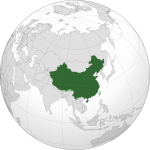| Chinglish | |
|---|---|
| Chinese English, China English, Engrish, Sinicized English | |
 A 2007 warning sign in Guilin states in Chinese: "(When there are) thunderstorms / Please do not climb the mountain." | |
| Native to | PRC and ROC |
| Region | East Asia |
Early forms | |
| Latin (English alphabet) | |
| Language codes | |
| ISO 639-3 | – |
 Map of China. Territory controlled by the People's Republic of China shown in dark green; territory claimed but not controlled is shown in light green. | |
| Chinglish | |||||||
|---|---|---|---|---|---|---|---|
| Traditional Chinese | 中式英文 | ||||||
| Simplified Chinese | 中式英文 | ||||||
| Literal meaning | Chinese Style English | ||||||
| |||||||
Chinglish is slang for spoken or written English language that is either influenced by a Chinese language, or is poorly translated.[1] In Hong Kong, Macau, Guangdong and Guangxi, the term "Chinglish" refers mainly to Cantonese-influenced English. This term is commonly applied to ungrammatical or nonsensical English in Chinese contexts, and may have pejorative or deprecating connotations.[2] Other terms used to describe the phenomenon include "Chinese English", "China English", "Engrish" and "Sinicized English".[3] The degree to which a Chinese variety of English exists or can be considered legitimate is still up for debate.[4]
- ^ Jing, Xiao; Zuo, Niannian (August 2006). "Chinglish in the oral work of non-English majors" (PDF). CELEA Journal. 29 (4). Archived from the original (PDF) on 7 July 2011.
- ^ Nury Vittachi (2000) From Yinglish to sado-mastication. World Englishes 19 (3), 405–414 doi:10.1111/1467-971X.00189
- ^ He, Deyuan & Li, David C.S. (2009). Language attitudes and linguistic features in the 'China English' debate. World Englishes Vol. 28, No. 1
- ^ Hu, Xiaoqiong. (2004). "Why China English should stand alongside British, American, and the other ‘world Englishes’." English Today. 78 (20.2). 26–33